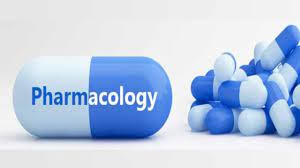Pharmacology (its branches and types of
drugs).
Pharmacology
is the study of drugs composition,properties and medical applications.the
sources of drugs are also studied in pharmacology.
Clinical
pharmacology was present in the middle age. Early pharamacologists focused on
natural substances, mainly plants excrats.pharmacology devolped in the 19th
century as a biomedical science.
Any
substance that, when absorbed into the body of living organism, alters normal
body function is known as a drug.drugs are badly classfied into two major
parts/ types.
A
pharmaceutical drug or a medical drug is defined as any chemical substances
that can used in the diagonsis,cure, treatment, or preventation of diseases.
Some drugs
often make a person dependent on them, or addicted. These may be called as
addictive drugs. By using such drugs, the person,s body become families with
them and the user cannot function well without it.
Medical drugs
Various
diseases have been made easier to treat in recent years by the production of
medical drugs. Drugs are obtain from the following sources.
1:synthetic drugs
Such drugs
donot occur naturally but are synthesized in labortatory.pharmaceutical
companies produce these drugs e.g aspirin.
2:drugs from plants and fungi
Many
important medicines are obtained from plants and fungi. These medicines
includes antibiotics, cardiotonics and certain analgesics.the antibiotic
pencillin comes from a fungus. The cardiotonics, known as digitalis , is used
to summulate the heart. It is made from the leaves of pupil flowered
plant,foxgloves.
3:drugs from animals
Drugs
obtained from animals are usually their glandular products.fish liver oils,
musk,bee,s wax,certain hormones and antitoxins are obtained from animal source.
4:drugs
from minerals
Several different
types of drugs are produced from minerals. The mineral iodine is used in making
tincture of iodine, a liquid that helps prevent infections when applied on cuts
and scrubes.the powder form of silver nitrate is applied on wound to stop
bleeding and prevent infections.
5:drugs from becteria
Manu
antibiotics e.g streptomycin are obtained from becteria.
PRINCIPLES USAGE OF IMPORTANT MEDICAL DRUGS.
·
ANALGESICS
(pain killers) reduce pain e.g aspirin, paractmol etc.
·
Antibiotics
inhibit or kill becteria and treate becterial infections e.g tetracycline,
cephalosprin etc.
·
Sedatives
induce sedation by reducing irritablity or excitement e.g diazepam.
·
Vaccines
are used to develop immunity againest viral and becterial infections e.g
vaccines againest small pox, whooping cough, hapatitis B etc.
|
Note: Sir alexander flemming
(1881-1955) was a scottish biologist. He descover the antibiotic penicillin
from the fungus penicillium notatun, for which he was awarded as nobel prize
in 1945. |
|
Note: Joseph lister (1827-1955) was an english surgeon.he promoted the idea
of sterile surgery for the first time. He introduced carbolic acid to
sterillise surgical instuments and to clean wounds.he was awarded by nobel
prize in 1951. |
ADDICTIVE DRUGS
THE
following are the catagouries of addictive drugs
1:sedatives
These drugs
are interect with nervous system to depress its addictives. Sedactives drugs
are induces dizziness, lethargy, slow the function of brain and depression.
Long term use of these drugs induces suicidal thoughts.
2:narcotis
These are
strong pain killers. These drugs are often prescribed in conjenction with other
less potent painkillers. These are used to relieve pain for paitents with
chronic diseases such as cancer. These are also used for relieve acute pain
after operations. But some peoples may abuse narcotics for ecstatic effects.
|
Note: In many western countries,herion is prescribed as a
strong analgesis under the name diamorphine.its use includes treatment for
acute pain and post-surgical pain. |
3:hallucinogens
These are
the drugs thet cause changes in perception. Thought, emotion and consciousness.
The group includes mescaline, which comes from a cactus and psilocin, which
comes from mushroom.
Physiologically,
hallucinogens affect on the sympathetic nervous system, causing dilation of
pupils, conscrition of some arteries and rise in blood pressure.
4:marijuana (hashish)
This is a
hallucinogens, which is smoked. It is obtained from the flowers, stems and
leaves of the marijuana plant. Small doses of these drug result in a feeling of
well- being thatlasts two three hours. The drug also increase the heart rate.
Thanks guys
for your visit if you want information about any post please visit our blog
home screen.
Thanks!.
Realeted
posts
·
Nervous system in detail.
·
The brain and its structure.
·
Respiration in living things.
Published to the biotech centre .




No comments:
Post a Comment